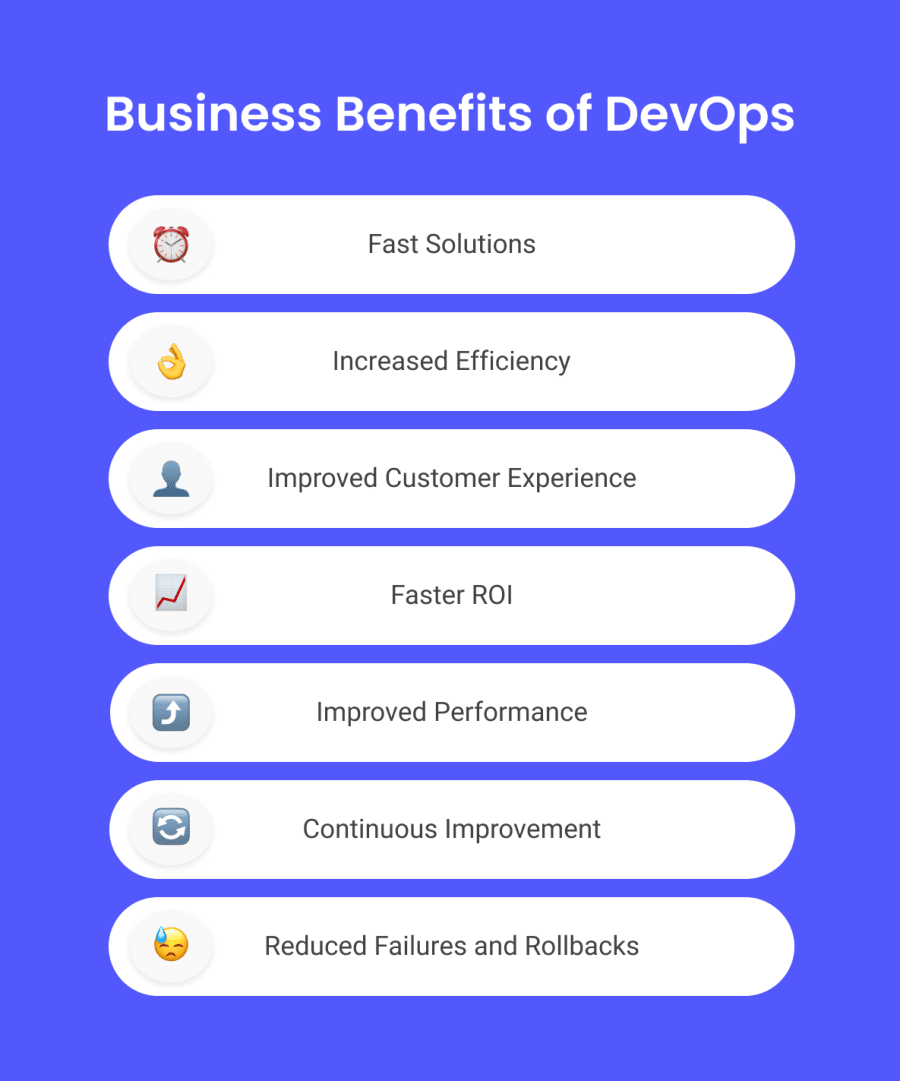NEW
Proxify is bringing transparency to tech team performance based on research conducted at Stanford. An industry first, built for engineering leaders.
Learn more
DevOps professionals are in high demand, and it's easy to see why. They are responsible for the continuous integration and delivery of code and for monitoring and managing servers, networks, and other infrastructure components of a company’s network.
DevOps is all about ensuring your company's software is running smoothly and efficiently. This means that if you're looking to hire a DevOps professional, you want someone who can provide the smooth operation of your software – and perhaps even help improve it.
DevOps, or Development Operations, is a job function that has become more prevalent in recent years. While it was certainly around in the 70s when computers were first being used in large businesses, DevOps as a function only really emerged in the 2000s. Companies are hiring DevOps specialists to handle their software development and deployment processes.
When you think about the buzz about DevOps in the past few years, it's easy to see why this role is now so coveted. In an age when software is eating the world, companies realize they need a strong DevOps culture to succeed. The combination of tech know-how and business awareness that comes with having a DevOps engineer on staff makes your company much more flexible than its competitors. Hiring a DevOps engineer should be your first priority if you want to stay competitive in today's business climate.
A large part of the reason DevOps has become so popular is because of how important it is for companies to stay competitive. Suppose a company needs to implement specific applications in their systems faster due to demand. In that case, they might risk losing customers – or at least have a more challenging time than competitors who can get things out faster. The DevOps engineer is there to help ensure this doesn't happen by making sure that customers' needs are met by keeping up with the software's rapid evolution at a quick pace.
With the growth of application and systems development, companies are increasingly adopting DevOps techniques to keep up with the pace of this ever-changing landscape. But what does it mean for the DevOps engineer? Is the job market for DevOps engineers really booming? Or is it more hype than reality? What should you look for in a DevOps candidate? What skills do they need to have? These are some questions we'll look at in this article and more.
We'll also show you how to conduct a thorough interview process so that you can hire the best possible candidate for your team. But before we get into that, let’s understand more about this role.
Understanding DevOps
The term "DevOps" has existed for several years but is still confusing for many. Many people associate DevOps with a particular position – a DevOps engineer, for example. The truth is that DevOps is an approach to information technology (IT) management that involves collaboration between the business and IT professionals who help manage the technology that powers it.
The DevOps engineer is a role that has been showing up on job boards more and more frequently. Suppose you're not familiar with the term. In that case, the DevOps engineer or developer-turned-DevOps engineer is someone who understands both software development and IT operations. In other words, someone who knows how to write code and how to deploy it, who can write unit tests and maintain production systems, and who can play with fire (figuratively speaking) and also help put out fires (a very literal description of their job).
Do you need a developer or a DevOps engineer? What's the difference?
Well, you probably need both.
Software developers create the applications that run on servers, while DevOps engineers manage those servers. The two roles are interdependent, but they're also very different. The developer works with code and creates software – the DevOps engineer works with servers, configuration management tools, and other infrastructure.
At some point during your hiring process, you'll want to understand precisely what you're getting in a DevOps engineer – and that means looking at how this role differs from your traditional developers and why someone would want to take it on in the first place.
As we'll cover below, there are a variety of positions within the DevOps world, so understanding not only what these jobs entail but how they differ from other roles will help you figure out what position might work best for your company.
The job market for DevOps engineers
DevOps engineers are in high demand because they can use their expertise to transform businesses. The DevOps engineer role has become a key position in the IT industry and continues to grow rapidly. According to gminsights the size of the DevOps market exceeded $7 billion in 2021, and the DevOps market gains will increase more than 20% by 2028. And the number of DevOps jobs is still expected to grow more than 20% annually between 2020 and 2026.
Many companies quickly realize how much of an impact they can have. Whether it's working with developers or operations teams, companies need someone who can bridge the gap between their two worlds and ensure everything runs smoothly.
While the job market for DevOps engineers is competitive now, it will only become more competitive in the future. The most expensive part of your company is its team. If your budget limits you, it might be tempting to hire a less-expensive DevOps engineer. But at the end of the day, recruiting the wrong individual could cost you your business. It takes time to train new people, and it takes even longer when you're trying to retrain a non-technical person into a DevOps engineer. That's why it's important to hire the right person for the job in the first place.
There are many different types of companies that hire DevOps engineers, including
- Software companies
- SaaS providers
- Management consulting firms
- Cloud storage providers
Companies that use DevOps
DevOps is used by many companies in the tech industry today. Here is a list of just a few of them:
- Amazon
- HP
- Netflix
- Walmart
- Etsy
- Target
- Meta
- Adobe
- Sony Pictures Entertainment
Why do businesses need DevOps engineers?
The answer is simple: because they make things easier.
DevOps engineers are usually responsible for automating processes currently done manually by humans. They devise ways to automate repetitive tasks and take care of them on the backend so that employees don't have to worry about them anymore. This leaves developers free to focus on their primary job – creating new features and improving existing ones – instead of spending time on busy work like setting up servers or ensuring backups are working correctly.

Credit: OnGraph.com: Why an investment in DevOps is worth it
If you're looking to hire a DevOps engineer, you probably already run a web service or application deployed on the web. You want to increase the frequency of sending out new features while ensuring that doing so doesn't cause too much downtime. You want to make it easy for any developer to quickly deploy code and any system administrator to quickly roll back should something go wrong with an update. This is where DevOps engineers come in: they become the go-between for both departments and encourage a culture of trust) between team members, coordinating their efforts so that precious time and money aren't wasted trying to head off problems in advance or correcting them afterward.
We spoke to Anmol Nagpal, a DevOps expert, on the importance of hiring DevOps in your company.
“DevOps plays a significant role. They are the ones who are taking care of the Cloud/Infrastructure. No company can grow without stable and scalable infrastructure, and applications will not be stable. Even if you have the best code, but the architecture is not good enough, the application will not be stable, and it can result in downtime, which leads to loss of money and business.”
Anmol Nagpal
Several candidates are skilled in DevOps; however, as a hiring manager, it helps to be able to tell how to judge a great candidate from a good one. Anmol suggests the potential candidate reflects the following. According to him, they should:
-
Have a mentality of getting things done in the best way
-
Do consistent updates on the latest tools in DevOps
-
Follow best security practices in whatever they build or design
-
Be a team player. They are the one who works with different team members around the engagement and has to support them
-
Be ready for new challenges
-
Be able to work independently without supervision
Positions DevOps typically fill
A common position in this field is a systems engineer, which involves designing and building software systems (like databases). Systems engineers work closely with developers and other technical staff members to ensure they have everything they need so that their engagements run smoothly and efficiently.
Another job title often associated with DevOps is infrastructure engineer. These professionals design and manage networks and storage systems for companies so that they can handle large amounts of data at once. They specifically build, maintain, and deploy coordinate the IT infrastructure using current technologies.
Other common titles within this field include:
- Site Reliability engineer (SRE)
Their primary duties involve testing and evaluating products when they are being manufactured. They are also expected to analyze data and manage asset reliability risks while working hard to reduce them.
- Configuration manager
Configuration managers are responsible for coordinating and directing configurations of all types of products. Typically, they oversee the life cycle of software or hardware production, such as the development of a new application or server.
- DevOps engineer
A DevOps engineer is an IT generalist who has extensive knowledge of development and operations, which typically includes programming, infrastructure management, systems administration, and DevOps toolchains.
A cloud engineer is an IT professional who builds and maintains a cloud infrastructure. They are specifically responsible for all technical tasks related to cloud computing, including design, planning, management, maintenance, and support.
- Solution architect
A solutions architect designs the overall technical vision for a particular solution to a business problem. They essentially bridge the gap between a business problem and the technology solution, outlining all the phases and requirements needed to implement that solution.
- Release engineer/manager
A release engineer deals with the development and processing of software products. A Release Engineering Manager oversees the software builds and releases and is mainly responsible for planning and controlling the software's development and delivery process.
- DevSecOps
DevSecOps seamlessly integrates application and infrastructure security with agile and DevOps processes and tools.
What are the job responsibilities of a DevOps engineer?
To simplify things, let’s stick to one role – DevOps engineer.
DevOps engineers work with other IT professionals such as developers, testers and quality assurance engineers. They help the team with implementing the features that are required by them by using various tools such as Puppet, Chef or Ansible to automate tasks that need to be done frequently.
The main roles and responsibilities are:
-
Implementing various development, testing, automation tools, and IT infrastructure
-
Building new features in applications
-
Defining and setting development, testing, releasing, updating, and supporting processes for DevOps operation
-
Troubleshooting and fixing bugs
-
Monitoring the processes during the entire lifecycle for their adherence and updating or creating new strategies for improvement and minimizing the wastage
-
Building automated processes wherever possible
-
Identifying and deploying cybersecurity measures
-
Incidence management and performing root cause analysis
-
Frequent communication with team members and with clients
-
Selecting the appropriate CI/CD tools and deploying them
-
Managing periodic reporting
Hiring suitable DevOps candidates
DevOps is a hot field right now; knowing how to hire the right people can be the key to your success.
You'll want someone with a track record of building and shipping products from start to finish – not just someone good with infrastructure management.
It may take work to find someone with the right experience and personality for your team. But with some preparation beforehand, you can stand out among other companies vying for this person's attention, increase your chances of getting them interested, and ultimately get them onto your team.
Here are some things you should consider when hiring:
- What are the needs of your company?
Do you need someone who can manage servers, or do you need someone who can manage software development? Are there specific skill sets that would be helpful?
- What is the background of the candidate?
Do they have prior experience? What kind of education do they have? Has their work in other companies been successful? Does their resumé show that they've worked well with others before? These questions will help you assess whether or not someone has what it takes to succeed at your company.
- How does this person interact with others?
Some people are naturally outgoing and make friends easily, while others prefer to keep to themselves. You want someone who will fit in well with the rest of your team.
- Look beyond what their CV says.
Do they have a great understanding of DevOps? It's essential to ensure they understand what DevOps means and how it relates to your company. If they don't understand these concepts or have no experience with them, then they probably won't be a good fit for this role or any other role within your company.
- Can they solve problems well?
This means that they must communicate effectively with others and ask questions to get answers about different concepts, processes, tools, etc., that may come up during their work.
- Are they effective communicators?
They must be able to explain their work in detail so that others can understand it, which could mean giving presentations or writing documentation based on what they've learned while working on engagements related to their job description. This could also mean being able to answer questions posed by customers or clients who want more information about how something works (or why it doesn't).
What education and experience should you look for in a DevOps engineer?
DevOps Engineers typically have a tertiary qualification in computer science or a related field, coupled with industry experience. To work in DevOps, individuals must have completed a Bachelor of Computer Science or a related degree focusing on software development.
You'll want to look for DevOps engineers with experience with different languages and frameworks. Having a broad knowledge base is essential. However, if they are especially skilled in one programming language, it can still be beneficial to your company, provided that they are experts in that language. The growth in popularity of DevOps has led to job opportunities for a vast array of different roles, but often the role of a DevOps Engineer will be defined by what you're trying to accomplish.
It's all about what your organization needs at that particular time. If you're just getting started, hiring someone with coding and operational experience is best. Many organizations may want to hire someone who can do more functional work, such as implementing monitoring or automation tools, before hiring a full-time software engineer. This will allow you to grow the team while spending less money initially on the down payment for hiring developers.
Language and framework experience
As you already know, DevOps Engineers are a hybrid type of software engineer that is required to have a solid understanding of both software engineering principles and the operations and infrastructure of web applications. This requires that they be experienced in the following:
It's essential to look for a DevOps Engineer with experience in Java, and, ideally, Apache Tomcat. The next most important factors are SQL and MySQL, but you should also look for knowledge of DevOps tools like Puppet, Chef, and Ansible.
Anmol suggests other essential skills for DevOps professionals to know, so they can be able to do their job well as the following:
- Debugging and Analytics skills – this helps to understand the problem.
- Documentation – This is a skill not everyone has, and its really important to have the proper documentation so that no knowledge is lost.
- Setup Priority – Being in DevOps, people will come to you with 100 things, but it should be your skill to understand and set the priority for the tasks.
- Proactive – In DevOps this is key; you need to actively monitor the infra/Application and ensure we follow the best practices. In case we find something, acknowledge it and get that sorted based on priority.
- Understand the business/product, this will help you to design and deliver the right infrastructure.
As the DevOps movement grows, so do the possibilities for career growth. A good DevOps engineer is a jack-of-all-trades who can handle all parts of the software development cycle. They need to be able to solve problems quickly, communicate those solutions with their team and have a broad range of technical knowledge.
Conducting effective interviews for DevOps engineers
An effective interview is a crucial part of hiring the right person for your team, but it's not always easy to identify a candidate that will be the perfect fit for a position that requires such a diverse set of skills. To help with the process, understanding what soft skills to look for amongst prospective DevOps engineers is an essential first step.
Required soft skills
Soft skills are just as crucial for the success of a DevOps engineer as technical skills. Soft skills are generally considered to be communication, problem-solving, and relationship-building abilities. These skills are essential for guiding the team to coordinate and collaborate effectively, build rapport with stakeholders, and efficiently resolve problems. The following is a breakdown of soft skills that DevOps engineers should possess:
-
You need a strong communicator. To communicate effectively, a DevOps engineer needs to be able to listen effectively, speak clearly and concisely, and express ideas with precision. This person could be handling a lot of responsibilities on their own, so they need to be able to clearly explain the reasoning behind any decisions they make. The best way to do this is by asking good questions and listening carefully to the answers that are given. It is also crucial that they can point out other people's mistakes without being perceived as rude or condescending.
-
They should have great attention to detail and a willingness to go above and beyond in their work.
-
They should also never miss a beat regarding what needs to be done and when it needs to be done. This person will be responsible for creating processes that facilitate communication between your team and should be able to decipher between the necessary information and the information that can wait for another day.
-
Problem-solving is another vital aspect of the job. If a problem occurs within the IT infrastructure, it will most likely impact the entire organization. The DevOps engineer will essentially find ways to prevent those issues from happening in the future.
-
A pleasant, respectful attitude toward others will go a long way in ensuring that engagements run smoothly and that respective teams work well together.
Required technical skills
To work well within the DevOps environment, the skills required for this role differ from those of a traditional IT worker. DevOps teams often consist of people with a variety of different backgrounds and skill sets, so it's important that members are capable of working closely together and have a variety of skills listed below:
-
Experience with multiple operating systems – Linux knowledge is particularly useful
-
Scripting languages such as Bash, PERL, Python, and Ruby (using "gem" and other package managers)
-
Experience with programming languages such as Ruby, Python or Java
-
A familiarity with version control systems like Git
-
Having an understanding of Linux system administration is critical to being able to deploy new applications correctly
-
Modern web application frameworks and design patterns
-
Basic network knowledge
Anmol lists the following as critical technicals skills in DevOps:
“[An important technical skill needed is] Cloud (it can be Azure/AWS/GCP) – better to have knowledge of more than one, but if they are really good in one, it can be accepted.”
Anmol Nagpal
-
IAC (Terraform/Cloudformation/Pulumi/CDK)
-
Docker
-
Kubernetes
-
CI/CD (Jenkins/GitHub Actions/GitLab/Azure DevOps)
Interview questions + expected answers
Here is a compilation of interview questions along with their suggested answers, designed to assist both CTOs in preparing for interviews and DevOps engineers in their interview preparations.
For beginners:
- What are the differences between DevOps and Agile?
Expected answer: The key differences include:
- DevOps creates a marriage between all teams involved in software development and maintenance. However, Agile typically siloes specific tasks to different teams.
- DevOps places a large focus on consistency, stability, and automation. With Agile, more emphasis is placed on adaptability and iterative development instead.
- In DevOps, the entire software workflow is considered, from ideation to delivery of the output and maintenance. But with Agile, it usually generally ends when the code is complete.
- What is the role of continuous testing?
Expected answer: Continuous testing is when software is frequently tested for bugs at every stage of its development lifecycle. During this process, there is continuous feedback between stakeholders, and developers are able to evaluate software quality throughout the process.
- What is the role of automation testing?
Expected answer: Automation testing is when scripts are automatically reviewed and validated to ensure that the program being used is verified. There is no need for human intervention, which makes automation testing time-sensitive.
- What is meant by branching?
Expected answer: Branching is a technique developers use in version control systems where source code is copied to create two versions that are developed separately. These branches can then be developed independently without affecting the code base, which encourages collaboration.
- What do you know about Jenkins?
Expected answer: Jenkins is the most popular continuous integration and continuous delivery (CI/CD) tool that is currently on the market. Many DevOps teams (if not all) rely on Jenkins to automate parts of software development related to the build, test, and deployment of applications.
- What are the benefits of version control?
Expected answer: Version control systems improve the efficiency of coding. This is achieved through:
- Traceability: It tracks changes to code from all developers, which results in a clear history that helps improve the functionality of the software.
- Branching: Developers get to work on code independently without impacting contributions from other collaborators.
- Error reduction: It can detect the root cause of software bugs and pick up any duplications.
Intermediate & Expert
- What challenges exist when creating DevOps pipelines?
Expected answer:
Feature flags are a common way of dealing with product releases inside of CI environments.
If a database migration was unsuccessful but was run as a scheduled job, the system may now be in an unusable state.
- How do Containers communicate in Kubernetes?
Expected answer: A Pod is a mapping between containers in Kubernetes and can typically contain multiple containers. Pods have a flat network hierarchy inside an overlay network and communicate to each other in a flat fashion, meaning that in theory, any pod inside that overlay network can speak to any other Pod.
- How do you restrict the communication between Kubernetes Pods?
Expected answer: Depending on the CNI network plugin that you use, if it supports the Kubernetes network policy API, Kubernetes allows you to specify network policies that restrict network access.
Policies can restrict based on IP addresses, ports, and/or selectors.
- What are the two main types of branching strategies?
Expected answer:
Release branching, which creates a branch for a potential new release.
Feature branching, which creates a branch for specific features or tasks.
- How do you build a hybrid cloud?
Anmol answers:
“While building a hybrid cloud, we must first ensure what kind of data we are running in Datacenter and how critical it is; let's suppose we want to connect it with AWS. We have two options: first, we can go with site2site VPN, which will be less expensive and easy to set up. Secondly, Direct connect, which is more stable but expensive and time-consuming.”
Anmol Nagpal
- What are the critical differences between asset management and configuration management?
Expected answer: Configuration management refers to managing assets as entities within the software development pipeline. This involves reviewing the accuracy and reliability of different configuration items, as well as the relationships they have with each other.
To ensure that all applicants are qualified, ask questions about how they would handle situations where they need to communicate with people from different departments. You could also ask them what their favorite part of working as a DevOps engineer has been so far or what challenges they regularly face in their current role. Questions like this will provide insight into how the applicant works in a team environment, which is an essential skill for any DevOps engineer.
According to Anmol, apart from checking for technical and soft skills, there are a few questions he would ask other developers he is likely to hire on his team.
“I’d ask them what's the best or worst thing about being a DevOps. Whether they enjoy working late at night and being available on weekends. I’d also like to know what their free time looks like. Whether they read tech blogs or do some POCs in their free time.”
Anmol Nagpal
Other questions he suggests asking are:
-
What is the best thing you did in your last engagement?
-
What was the big mistake you made in your career at DevOps?
-
How eager are you to learn new tools and technologies?
Possible challenges of hiring a DevOps engineer
Hiring a DevOps engineer to join your organization is a big decision. On the one hand, you can't ignore the power of the DevOps process: it's proven to be a great way to manage software development and deployment. But on the other hand, some challenges make this kind of hire more complex than hiring a software developer or a systems administrator.
How do you know if your team is ready for this position? What can you do to help ensure that you get the right person for the job? Here are some things to consider when hiring a DevOps engineer, with tips on ensuring your team is prepared and aligned to work with them.
-
The first challenge is the amount of time it takes to find and evaluate candidates. Finding someone who has the skillset, experience, and personality you're looking for can take weeks, if not months, with other channels.
-
Another challenge is managing the expectations of both your company and the candidate. You'll want to make sure your company's needs are met, but you also want to make sure that you don't waste valuable time on candidates who aren't going to work out.
-
You need to find the right person. Many companies don't have the resources necessary to conduct thorough searches or offer competitive salaries for DevOps engineers (especially if they're young). This means that it can take longer than expected to find the right person for the job – or worse yet, you might end up settling on someone who doesn't meet your needs at all.
-
You'll also need to make sure you hire someone who can get along with the people already working in the team. A new hire should be able to integrate seamlessly into the team, and not be someone who will create problems for others or cause office drama.
-
Deciding on compensation could be a hassle. If you're using recruiters or headhunters, they often have their own ideas about what a DevOps engineer should cost, and they may try to convince you that they're worth much more than they really are.
-
If you're hiring a DevOps engineer from another company, it's important to make sure that person's skillset matches what you need. Some companies may have developed their own tools that they use for a variety of purposes.
-
The final challenge comes after you've hired someone and put them in place: maintaining their motivation and productivity throughout their tenure at your company. This can be difficult because it involves managing multiple departments within an organization as well as working with individuals from different backgrounds with varying levels of skill sets.
The hiring process for a DevOps engineer can be complicated, but it's important to remember that it's also necessary if you want to have a successful company in today's industry. The right person can help your company grow and increase profits while saving money in the long run by ensuring everything runs smoothly without any issues.
Final thoughts
DevOps engineers are brilliant individuals that possess diverse knowledge in the areas of programming, development, and infrastructure. Their duties vary depending on what their team requires, but they nonetheless keep a pulse on everything under the DevOps umbrella. This can make them difficult to find and hire, but it is worth it – their expertise lays the groundwork for new technology being developed by a company to succeed.
It is without a doubt that the job market for DevOps engineers is competitive and getting more so every day. And with the technology landscape constantly in flux, it's hard to predict what skills will be most sought after tomorrow. If you want to get a jump on the competition, it's best to start early and hire one for your team.
Hire a DevOps magician today, and watch your engagements transform from good to great!



















